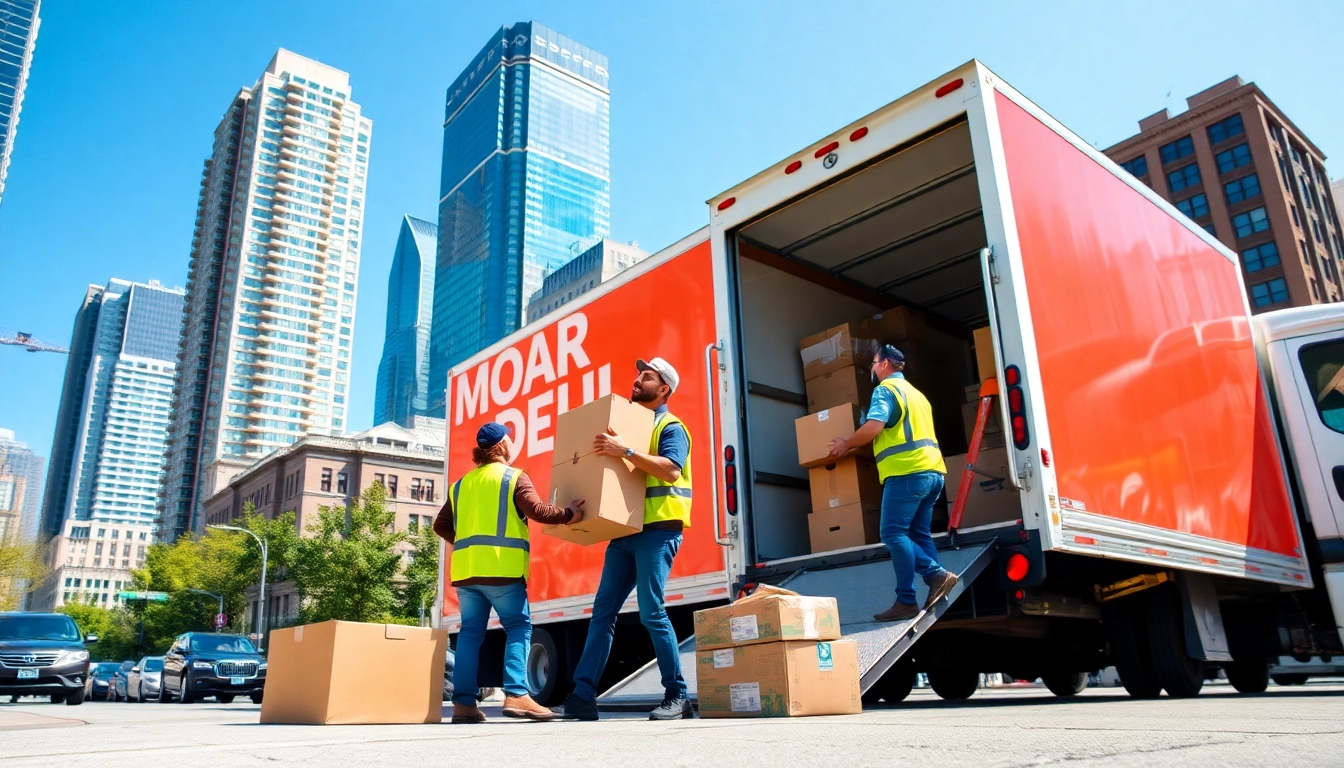Understanding Your Moving Needs in Toronto
Moving can be a complex and overwhelming experience, especially in a bustling city like Toronto. Whether you’re relocating your home or your business, understanding your specific moving needs is the first step towards a successful transition. Engaging with movers Toronto can make a significant difference in your moving experience, allowing you to focus on the excitement of your new location rather than the stress of moving day.
Identifying Different Types of Moves
Before starting the moving process, it’s essential to identify what type of move you are undertaking. Different moves require different approaches, strategies, and services. The most common types of moves in Toronto include:
- Residential Moves: Relocating personal belongings from one residence to another, whether within the same neighborhood or to a different part of the city.
- Commercial Moves: Moving a business or office, which often involves transporting office equipment, furniture, and important documents.
- Long-Distance Moves: These involve moving to a location outside of Toronto, often requiring additional planning and logistics.
- International Moves: Moving to another country involves customs regulations, shipping logistics, and often significant paperwork.
Budgeting for Your Move
Creating a budget for your move is crucial. Many factors influence moving costs, such as distance, the amount of belongings, and additional services required (like packing or storage). Here’s how to create a comprehensive moving budget:
- Get Estimates: Reach out to several moving companies for quotes. This helps you understand the average costs involved.
- Plan for Additional Costs: Consider costs that might arise during the moving process, such as packing materials, transportation fees, and potentially storage fees.
- Set a Contingency Fund: It’s wise to set aside 10-15% of your total moving budget for unexpected expenses.
Choosing the Right Services
Not all moves are the same, and the services you choose should cater specifically to your needs. Here are some options to consider:
- Full-Service Moving: This includes packing, loading, transporting, and unpacking.
- Self-Service Moving: You handle the packing and unpacking, while the moving company provides transportation.
- Packing Services: Assistance with packing and organizing your belongings can significantly reduce stress.
- Storage Solutions: If you require temporary storage, ensure your moving company offers secure storage options.
Preparing for Your Move
Creating a Comprehensive Moving Checklist
A detailed moving checklist can keep you organized and ensure you don’t forget any vital tasks. Start your checklist with the following steps:
- Six to Eight Weeks Before Moving: Research moving companies, get estimates, and book your chosen movers.
- Four Weeks Before Moving: Begin packing non-essential items and start notifying utility companies, banks, and subscriptions of your change of address.
- Two Weeks Before Moving: Confirm moving arrangements with your moving company and finalize any additional services.
- One Week Before Moving: Pack essentials that you will need immediately after arriving at your new home.
- Moving Day: Ensure quick access to your essential box and supervise the loading process.
Tips for Packing Efficiently
Packing is one of the most labor-intensive tasks during a move. To pack efficiently:
- Start Early: Packing can take longer than anticipated, so start weeks in advance.
- Use Quality Packing Materials: Invest in sturdy boxes, bubble wrap, and packing tape to protect your belongings.
- Label Everything: Clearly label your boxes by room and content for easy identification during unpacking.
- Keep an Inventory: Create a list of all packed items to ensure nothing is lost during the move.
- Pack Heavy Items in Small Boxes: This makes them easier to carry and minimizes the risk of injury.
Organizing Utilities and Services
Switching utility services during your move is crucial for a smooth transition. Here’s how to effectively manage this task:
- Contact Utility Providers: Initiate contact with your current and new utility providers for disconnection and connection dates.
- Set Up Internet and Cable: Prioritize setting these up in advance, as they may take longer to activate or install.
- Transfer or Set Up Insurance: Make sure your homeowner’s or renter’s insurance covers your new place.
Choosing the Best Movers Toronto
Evaluating Moving Companies
Choosing the right movers is essential in ensuring your items are handled with care. Consider the following methods for evaluating potential moving companies:
- Check Qualifications: Ensure the company is licensed and insured to operate in your area.
- Read Reviews: Use platforms like Yelp or Google Reviews to read customer experiences and testimonials.
- Ask for Referrals: Speak with friends and family for recommendations based on their own experiences.
Reading Reviews and References
Customer reviews can provide insight into a moving company’s reliability and professionalism. Here’s how to interpret these reviews:
- Look for Patterns: Frequent complaints about a particular issue can be a red flag.
- Consider the Source: Reviews from verified customers or reputable platforms carry more weight.
- Reach Out for References: A trustworthy company should be willing to provide references upon request.
Understanding Moving Contracts
Moving contracts can often be complicated. To protect yourself:
- Read Everything Carefully: Understand all terms and conditions, fees, and services included.
- Ask Questions: Don’t hesitate to clarify anything that is unclear before signing the contract.
- Get Everything in Writing: Ensure any promises or agreements are documented in the contract.
Executing Your Move Day Successfully
Timeline for Your Moving Day
Having a clear timeline for moving day helps everything run smoothly. Here’s a general timeline to follow:
- Morning: Ensure your essentials box is easily accessible and keep breakfast light to avoid distractions.
- Arrival of Movers: Be present to guide the movers and ensure they understand your layout and requirements.
- Packing the Moving Truck: Supervise the packing to ensure that heavy items are loaded first, followed by lighter boxes.
- Final Walkthrough: Before leaving, do a final walkthrough of your old home to ensure nothing is left behind.
Handling Unexpected Events
No move goes completely according to plan. Here are some tips to handle unexpected events:
- Stay Calm: Panicking won’t help; assess the situation and adjust your plans accordingly.
- Communicate: Keep lines of communication open with your moving company and anyone involved in the process if issues arise.
- Be Flexible: Adapt to changes, whether they involve delays or adjustments to logistics.
Ensuring Your Belongings Are Safe
To ensure the safety of your belongings throughout the move:
- Choose the Right Packing Materials: Use boxes that are appropriate to the weight and fragility of items.
- Label Fragile Items Clearly: Ensure labels indicate fragility to help movers handle these boxes with care.
- Consider Insurance Options: Look into moving insurance options to provide added security for your belongings.
Post-Move Considerations
Unpacking and Settling In
After a successful move, the unpacking process begins. To make this task easier:
- Unpack Essentials First: Start with necessities such as kitchen items, toiletries, and clothes for the first few days.
- Organize as You Go: As you unpack, organize items by room to make settling in more manageable.
- Take Breaks: Unpacking can be exhausting; take regular breaks to avoid burnout.
Updating Your Address and Important Records
Once you’ve settled in, it’s essential to update your address with various services and institutions:
- Postal Service: File a change of address with the postal service to ensure mail is forwarded.
- Bank and Financial Institutions: Update your address with banks, credit card companies, and other financial services.
- Health Care Providers: Ensure your doctor and dentist have your new address on file to maintain continuity of care.
Leave Feedback for Your Moving Experience
Sharing your moving experience helps others make informed decisions. Consider:
- Writing Reviews: Share your feedback on platforms where you found your movers or on social media.
- Provide Constructive Feedback: If there were issues, provide constructive feedback to help your moving company improve.
- Celebrate Your New Start: Acknowledge the stress you overcame and embrace the opportunities your new location offers.



